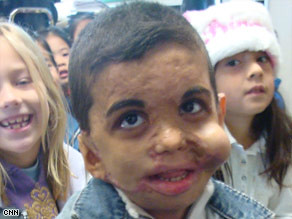
Courtesy Photo: Youssif
Rachel Decker
The Paw Print
Youssif was only five years old when he became horribly disfigured. It was Jan. 15, 2007. That same day, US troops had surged the Iraqi capital to cut down on sectarian violence that plagued Baghdad.
Youssif was playing outside that day while his mother was cleaning the house. Suddenly, the boy’s screams could be heard inside, and his mother rushed to see what was happening.
“I thought someone was fighting or something,” his mother Zaineb said back in 2007. The boy was not fighting; he was struggling for his life. Several masked men had rushed up to Youssif, doused him in gas, and set him on fire.
When his mother first saw Youssif like that, she fainted. She barely recognized her own son when she awoke.
“His head was so swollen, you couldn’t see his eyes, and his nose was pushed in. The skin was melted off.”
Youssif was taken to an Iraqi hospital, where he spent two months being treated with primitive care. The doctors did not have sufficient medical supplies to give the young boy the help he needed.
His father Wissam (the press has kept the family’s last name confidential for concern of their safety), desperate for his son’s life, wound up on the doorstep of CNN’s Baghdad headquarters. He told them the story of Youssif, and CNN broadcasted his story to get help for the boy.
Viewers around the world responded immediately to Wissam’s pleas. Hundreds of thousands of dollars were donated to the Children’s Burn Foundation in Los Angeles, California, the foundation that took in Youssif’s case.
Though the young boy has undergone dozens of plastic surgeries to heal his scars, his mental recovery has surpassed his physical recovery. Youssif is now nine. He loves to play soccer, and has now even joined the local team.
“I never used to do that in my country,” he says, “because it was kind of dangerous there.”
Just recently Youssif was awarded a “certificate of citizenship” from his elementary school for being exceptionally nice.
“One kid got hurt, and I helped him,” Youssif says. Another boy had gashed his arm, and Youssif applied an ice pack and helped stop the bleeding.
He is very proud of his award; he enjoys helping others who are hurt.
“I used to be hurt, so I know what it’s like. I don’t like seeing my friends hurt, because they shouldn’t have to be.”
Youssif’s attitude is very upbeat nowadays. When he was younger, his scars used to upset him, and he refused to talk about what happened. But now, he says his looks no longer bother him.
“None of my other friends make fun of me. No one makes fun of me now, so it doesn’t make me sad anymore.”
He has so completely recovered from his injuries that he no longer remembers what happened that day. He cannot recall the pain, he cannot recall the sadness, and he cannot even recall what his home was like in Iraq.
“His personality has changed so much,” says Zaineb. “The way he interacts with people — everything. It began as soon as he started school and realized that the children don’t care about his appearance. It allowed him to have a normal life.”
What’s Been Said…